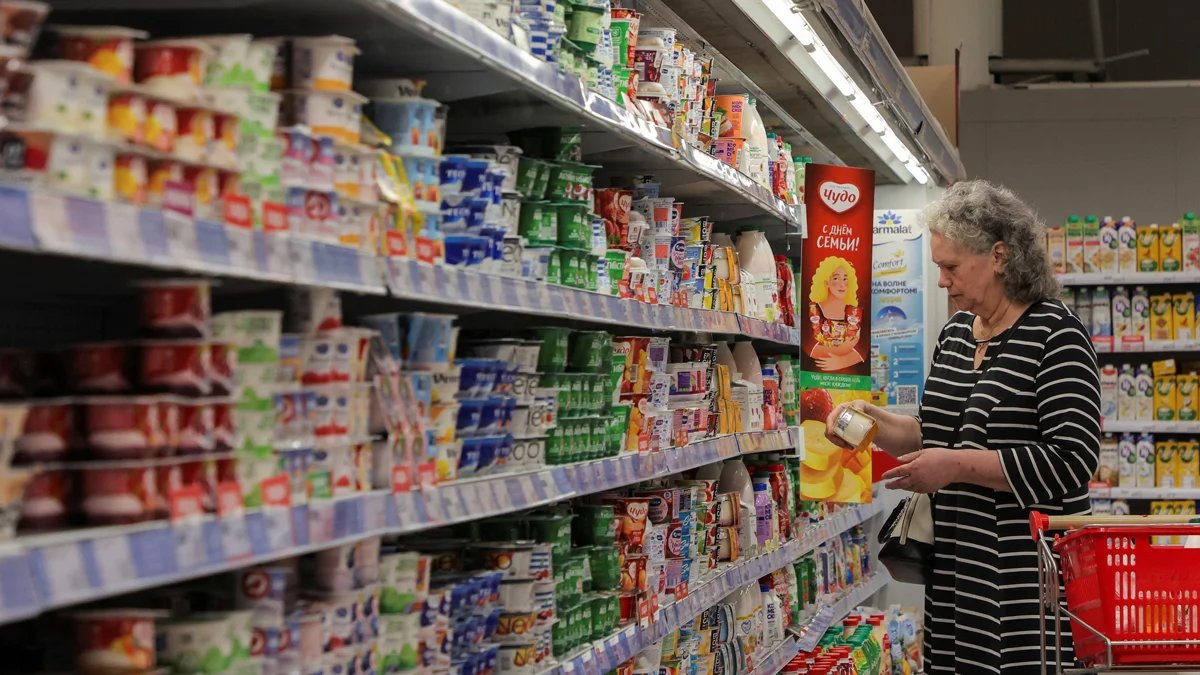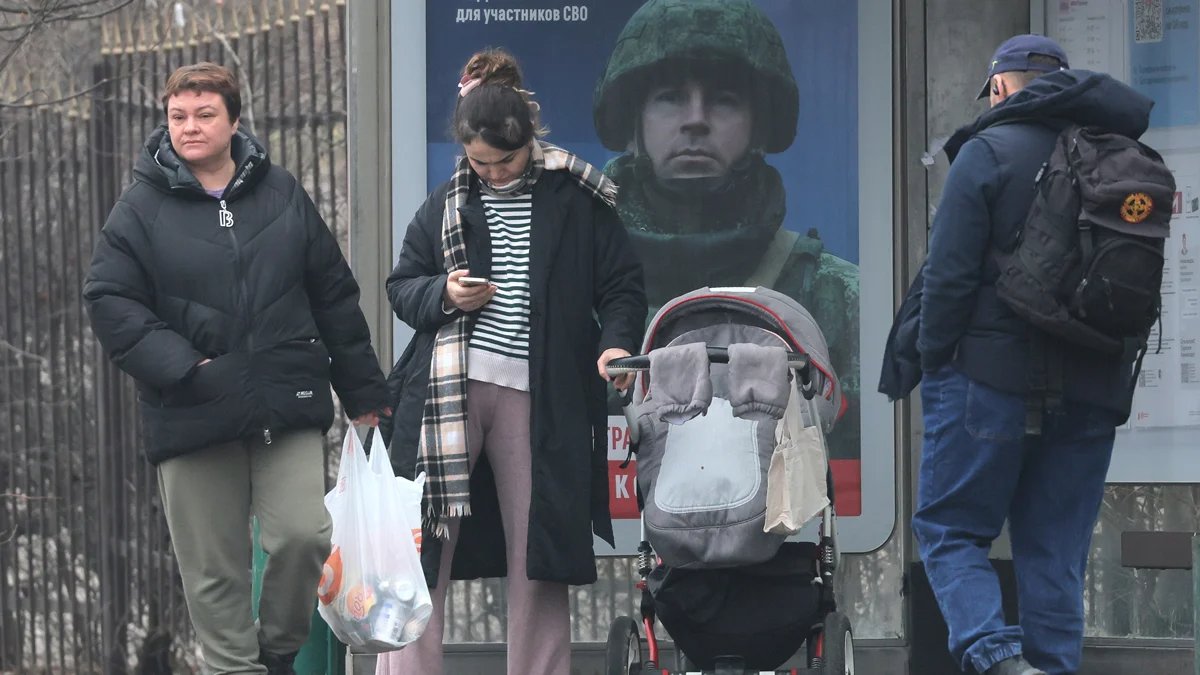


Russia’s Finance Ministry has proposed raising VAT to 22% to cover a hole in the federal budget caused by increasingly out-of-control military spending, with the new rate to be introduced as early as next year. Economists who spoke to Novaya Europe say the increase on VAT will slow down the economy, leading to a new wave of inflation and price rises on most goods and services, and leave ordinary Russians out of pocket.
The Finance Ministry has submitted its draft budget for 2026 and for the planning period of 2027-2028 to the government, including a proposal to raise VAT from 20% to 22%. Food, medicines and children’s goods will retain a lower VAT rate of 10%, the ministry promised. Should the amendments be adopted, they will come into force on 1 January.
The proposed rise in VAT would add 1 trillion rubles (over €10 billion) to the federal budget each year, accordig to estimates by independent news outlet The Bell. The increased funds will be directed primarily at “financing defence and security”, the ministry said.
“The revenue planned for in the budget will provide the armed forces with the necessary weapons and military equipment, and cover salaries” as well as the modernisation of the military-industrial complex, the ministry website explains.
As Novaya Europe reported earlier this month, Russia’s military-industrial complex currently consumes approximately one third of state expenditure. That expenditure has almost doubled the size of the budget compared to that for 2019–2020, which in turn drives inflation.
“We can see that Vladimir Putin has no intention of stopping the war. And the easiest way to plug the hole in the budget is to increase taxes, in this case VAT.”
The Russian budget deficit for the first eight months of 2025 is thought to amount to 4.19 trillion rubles (€50 billion), which needs to be compensated for somehow, according to one Russian economist who spoke to Novaya Europe on condition of anonymity.
“We can see that Vladimir Putin has no intention of stopping the war. And the easiest way to plug the hole in the budget is to increase taxes, in this case VAT,” he told Novaya Europe.
Ruben Yenikolopov, a professor at the Barcelona School of Economics, agreed with that analysis, telling Novaya Europe that the deficit had previously been plugged using financial reserves and public debt, but that the reserves were now dwindling, and borrowing has become very expensive.
“Therefore, one way is to either reduce civilian expenditure even further, which will most likely happen anyway, but the principle choice is to increase revenue. And the only way to increase revenue in an economy under sanctions is to raise taxes,” he continued.

A shopper at a grocery store, St. Petersburg, 27 June 2024. Photo: Anton Vaganov / Reuters / Scanpix / LETA
Speaking last year at the Federal Assembly, Vladimir Putin said taxes should remain stable until 2030, after which there would be a new “approach to help modernise our fiscal system and bring about a more equitable distribution of the burden by raising the taxes of those earning higher personal and corporate incomes”.
In a speech at the St. Petersburg International Economic Forum in June, Finance Minister Anton Siluanov also promised not to raise taxes, despite conceding that the situation around the Russian budget was “turbulent”.
Commenting on the draft budget submitted to the State Duma for 2026–2028 on Wednesday, Kremlin spokesperson Dmitry Peskov called it “absolutely balanced”, saying that such tax moves were “a completely normal process for a state at this stage of development”. Peskov said that Russia had to win this war “for the sake of [our] children and grandchildren. This is now the most acute stage of the war, and it will determine the future ... Hence our patriotism.”
An increase in VAT is the “lesser of all evils” when it comes to shoring up the treasury without slamming the brakes on the economy.
VAT is easier to collect than personal income tax, where individuals are tempted to lie about their earnings, or through a tax on profits, which companies can understate, an anonymous economist told Novaya Europe. VAT is included in the price of goods, is difficult to evade, and provides a reliable and predictable revenue stream into state coffers.
Moreover, despite VAT being so noticeable — everyone sees exactly how much more they are paying on their receipts every time they buy goods in a store — it harms economic growth less than any other tax, says Yenikolopov, adding that it is considered “the least distorting” form of taxation. A VAT increase also tends to have the least impact on decision-making by individuals and companies, as people don’t work less or rein in their spending as a result.
“If you want to raise taxes without completely stifling the economy, VAT seems to be a reasonable choice,” he says. Other taxes, such as excise duty on the oil sector, could harm the economy far more, and the oil and gas sector are already contributing as much as they possibly can at present. Thus, an increase in VAT is the “lesser of all evils” when it comes to shoring up the treasury without slamming the brakes on the economy, Yenikolopov concluded.

A propaganda billboard in support of the Russian armed forces at a bus stop in Moscow, 13 March 2025. Photo: Maxim Shipenkov / EPA
If the budget deficit persists and the VAT increase doesn’t solve the problem, the government will be forced to identify new sources of income, says Yenikolopov. “It is very difficult to know what the Finance Ministry is thinking or to predict what other sacrifices it might be willing to make,” he says, adding that the government would close any tax loopholes to aid the budget.
Tax incentives for the self-employed may also be at risk. The government has already spoken of “needing to analyse” the tax breaks currently enjoyed by over 13 million self-employed people in the country. Yenikolopov points out that the government promised not to touch the self-employed for 10 years, which would mean leaving their tax incentives in place until 2028, but that situation may change.
As external revenue from gas and oil exports falls while the war requires ever greater amounts of money, the state will be forced to look for new domestic sources to fill the gap.
An increase in VAT is likely to hit economic growth, which would, in turn, reduce future budget revenue, creating a vicious circle, an unnamed economist told Novaya Europe, who said that as external revenue from gas and oil exports falls while the war requires ever greater amounts of money, the state will be forced to look for new domestic sources to fill the gap.
“Anything might happen”, including further tax increases, the economist added. If the state is going to continue the war, it must find reserves to plug the hole caused by increased military spending. And since the prospects for export revenue look bleak, the principal revenue streams will have to be domestic.
The Russian government has banned independent media. We were forced to leave our country in order to keep doing our job, telling our readers about what is going on Russia, Ukraine and Europe.
We will continue fighting against warfare and dictatorship. We believe that freedom of speech is the most efficient antidote against tyranny. Support us financially to help us fight for peace and freedom.
By clicking the Support button, you agree to the processing of your personal data.
To cancel a regular donation, please write to [email protected]
VPNovaya
Help Russians and Belarusians Access the Truth

